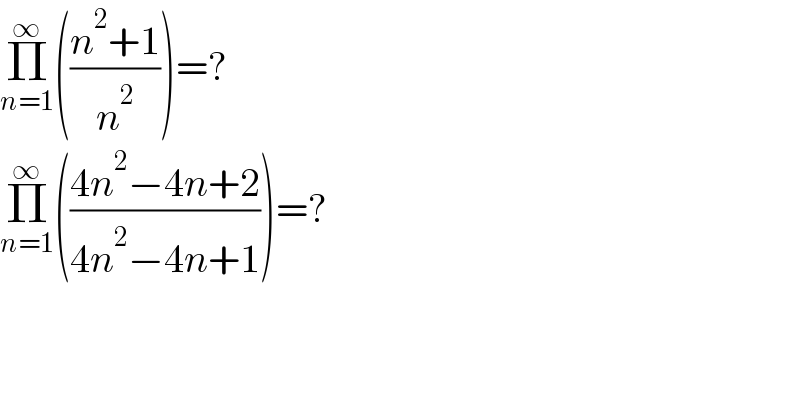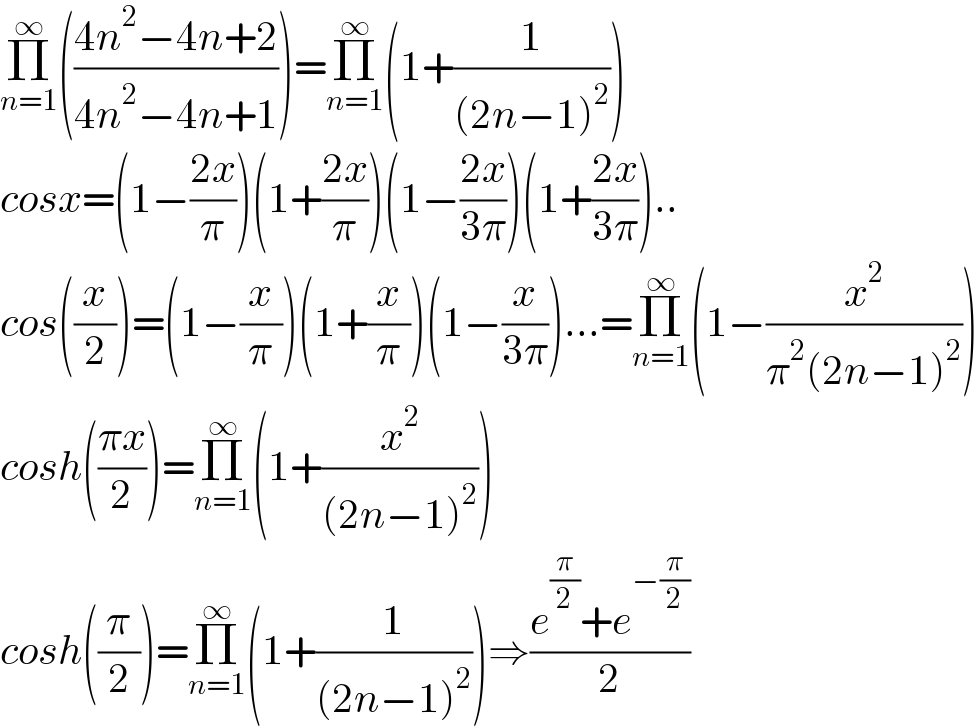Question Number 133628 by Ñï= last updated on 23/Feb/21

$$\underset{{n}=\mathrm{1}} {\overset{\infty} {\prod}}\left(\frac{{n}^{\mathrm{2}} +\mathrm{1}}{{n}^{\mathrm{2}} }\right)=? \\ $$$$\underset{{n}=\mathrm{1}} {\overset{\infty} {\prod}}\left(\frac{\mathrm{4}{n}^{\mathrm{2}} −\mathrm{4}{n}+\mathrm{2}}{\mathrm{4}{n}^{\mathrm{2}} −\mathrm{4}{n}+\mathrm{1}}\right)=? \\ $$
Answered by Dwaipayan Shikari last updated on 23/Feb/21

$$\underset{{n}=\mathrm{1}} {\overset{\infty} {\prod}}\left(\mathrm{1}+\frac{\mathrm{1}}{{n}^{\mathrm{2}} }\right)=\frac{{sinh}\pi}{\pi}\:\:\:\:\:\underset{{n}=\mathrm{1}} {\overset{\infty} {\prod}}\left(\mathrm{1}+\frac{{x}^{\mathrm{2}} }{{n}^{\mathrm{2}} }\right)=\frac{{sinh}\left(\pi{x}\right)}{\pi{x}} \\ $$
Answered by Dwaipayan Shikari last updated on 23/Feb/21

$$\underset{{n}=\mathrm{1}} {\overset{\infty} {\prod}}\left(\frac{\mathrm{4}{n}^{\mathrm{2}} −\mathrm{4}{n}+\mathrm{2}}{\mathrm{4}{n}^{\mathrm{2}} −\mathrm{4}{n}+\mathrm{1}}\right)=\underset{{n}=\mathrm{1}} {\overset{\infty} {\prod}}\left(\mathrm{1}+\frac{\mathrm{1}}{\left(\mathrm{2}{n}−\mathrm{1}\right)^{\mathrm{2}} }\right) \\ $$$${cosx}=\left(\mathrm{1}−\frac{\mathrm{2}{x}}{\pi}\right)\left(\mathrm{1}+\frac{\mathrm{2}{x}}{\pi}\right)\left(\mathrm{1}−\frac{\mathrm{2}{x}}{\mathrm{3}\pi}\right)\left(\mathrm{1}+\frac{\mathrm{2}{x}}{\mathrm{3}\pi}\right).. \\ $$$${cos}\left(\frac{{x}}{\mathrm{2}}\right)=\left(\mathrm{1}−\frac{{x}}{\pi}\right)\left(\mathrm{1}+\frac{{x}}{\pi}\right)\left(\mathrm{1}−\frac{{x}}{\mathrm{3}\pi}\right)…=\underset{{n}=\mathrm{1}} {\overset{\infty} {\prod}}\left(\mathrm{1}−\frac{{x}^{\mathrm{2}} }{\pi^{\mathrm{2}} \left(\mathrm{2}{n}−\mathrm{1}\right)^{\mathrm{2}} }\right) \\ $$$${cosh}\left(\frac{\pi{x}}{\mathrm{2}}\right)=\underset{{n}=\mathrm{1}} {\overset{\infty} {\prod}}\left(\mathrm{1}+\frac{{x}^{\mathrm{2}} }{\left(\mathrm{2}{n}−\mathrm{1}\right)^{\mathrm{2}} }\right) \\ $$$${cosh}\left(\frac{\pi}{\mathrm{2}}\right)=\underset{{n}=\mathrm{1}} {\overset{\infty} {\prod}}\left(\mathrm{1}+\frac{\mathrm{1}}{\left(\mathrm{2}{n}−\mathrm{1}\right)^{\mathrm{2}} }\right)\Rightarrow\frac{{e}^{\frac{\pi}{\mathrm{2}}} +{e}^{−\frac{\pi}{\mathrm{2}}} }{\mathrm{2}} \\ $$
